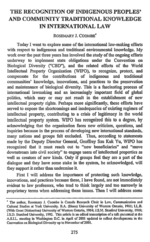“The Recognition of Indigenous Peoples’ and Community Traditional Knowledge in International Law”
“The Recognition of Indigenous Peoples’ and Community Traditional Knowledge in International Law”

“The Recognition of Indigenous Peoples’ and Community Traditional Knowledge in International Law.” St. Thomas Law Review 14: 275-285.
Link to article
Abstract: Protecting traditional knowledge has moved to the forefront of debates around indigenous peoples and international law. At its fundamental core, protecting traditional knowledge is about protecting the livelihoods of the global poor. Moreover, preserving genetic resources for future research and development is imperative. It is increasingly recognized that biodiversity is created through the interaction between human communities and local ecosystems; we need to create the conditions under which biological diversity continues to be created, and that means securing conditions that will enable those people who have traditionally nurtured and created biological diversity to continue to do so. Alternatives to the neoliberal market logic of instruments such as the TRIPs agreement should create conditions where indigenous communities can participate as equitable stakeholders in any dialogue regarding the extraction, modification, marketization and commodification of biological and cultural resources. In doing so, the potential for intellectual property to be employed to reduce and eliminate hunger and poverty, to safeguard the environment, to halt the loss of biodiversity, to empower women, and to ensure food and social security might be fully realized.
Date Published: 2001
Publisher: St. Thomas Law Review
Publisher Website: http://stthomaslawreview.org/